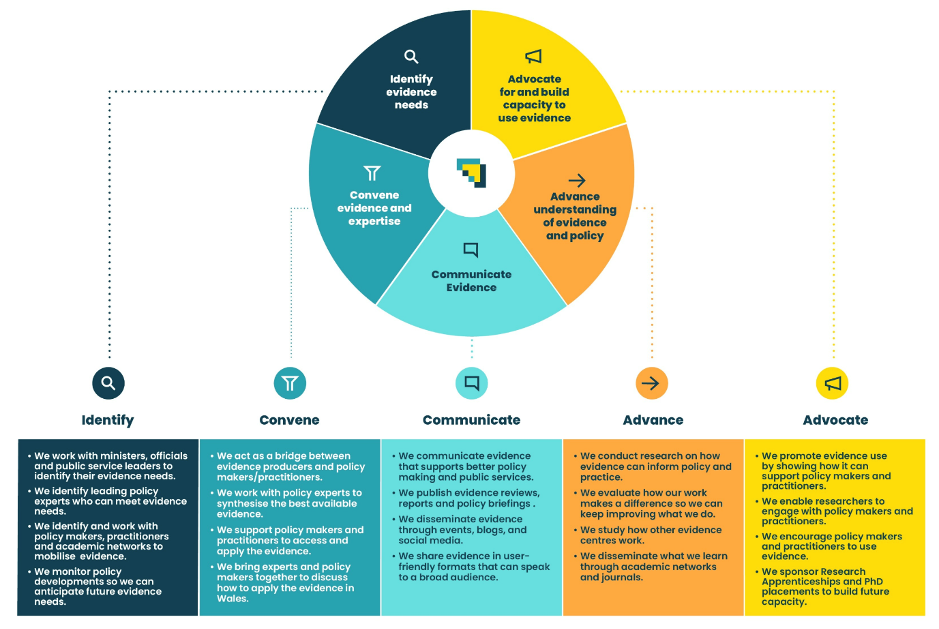Written by:
Eleanor MacKillop
Hannah Durrant
James Downe
Eleanor MacKillop, Hannah Durrant, and James Downe share activities, practices and learning from the Wales Centre for Public Policy (WCPP) research function. Outlining their work to provide a reflexive perspective in ‘real time’, they propose key lessons for knowledge brokering organisations.
The Wales Centre for Public Policy (WCPP) at Cardiff University is a UK What Works Centre that works with leading policy experts to provide ministers, the civil service, and public services in Wales with independent and authoritative evidence and expertise. We provide outputs such as evidence reviews and policy briefings and use roundtables to bring together experts and decision-makers to resolve evidence needs. WCPP has a dedicated research team, which was rare for a Knowledge Brokering Organisation (KBO) when it was set up in 2017.
In this blog, we consider the benefits of having a research team, reflect on what we have learnt, and outline lessons for other KBOs. These benefits can be summarised in two broad categories:
There has been a drastic increase in the number of KBOs sitting between research and decision-making, including a growing number of dedicated policy engagement bodies set up within UK universities. We have examined how and why these organisations have emerged, the activities and strategies they employ to inform policy and the impact they have. We also wanted to know more about what knowledge brokering means and whether it works. This research has helped us reflect on our own practice and fed directly into the work of the Centre, for instance by helping us to develop a Theory of Change which is not focused on inputs, outputs, and outcomes, but rather on key activities and what we expect them to achieve.

To support our practice, we examined effective approaches to knowledge mobilisation, particularly at the local level where context specificities can undermine generic ‘what works’ claims. We undertook a systematic scoping review of local models of knowledge mobilisation and interviews with knowledge mobilisers across the UK. This research has informed our approach to working with public services and Welsh Government, highlighting the importance of three key aspects of our knowledge mobilisation:
We also researched what counts as evidence to different actors in the decision-making process in Wales and Scotland. This project has stressed the importance of discussing what evidence means at the outset of projects to ensure there are clear expectations of the usefulness of the evidence that WCPP can provide.
A major challenge for all KBOs is demonstrating the impact of their work. We have undertaken several projects that aim to plug that gap. For instance, we have recently recruited a new embedded researcher to capture our impact on three pilot projects and assess the relationship between knowledge mobilisation processes and impact.
Funded by the ESRC, we are also leading a project analysing the impact of What Works Centres. This is a complex question as impact looks different across centres. This research is examining existing tools and models for assessing impact and feeding in knowledge from outside of the What Works Network, notably from UPEN, LPIPs and HDRCs.
We have learnt that a research team within a KBO needs to be fully integrated within the organisation, not perceived as being detached and solely focused on academic outputs. They need to work with all colleagues and be able to reflect critically on current ways of working and identify options to improve. This is a difficult balance to strike because it asks that we offer a reflexive perspective in ‘real time’ on how the KBO could function, whilst also working to different timescales in order to publish academic papers on evidence use. Our experience to date suggests that there remains much more to learn about how to do effective knowledge mobilisation, demonstrate the impact of our work, and help decision-makers at all levels to implement evidence. We welcome collaboration with others on these pursuits so we can learn together.